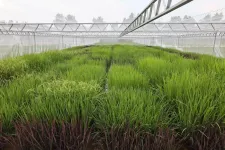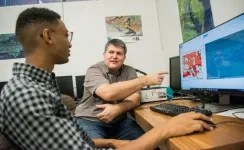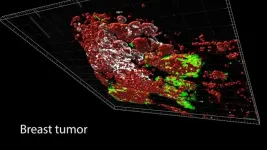(Press-News.org) Toronto, ON, October 30, 2024 – Three Baycrest leaders are among those named winners of Women Executive Network’s (WXN) prestigious 2024 Canada’s Most Powerful Women: Top 100 Awards, celebrating exceptional leadership and groundbreaking achievements that have meaningfully transformed their industries, companies, communities and country.
Dr. Allison Sekuler, President and Chief Scientist, Baycrest Academy for Research and Education and President and Chief Scientist, Centre for Aging + Brain Health Innovation, powered by Baycrest (CABHI)
Dr. Allison Sekuler was recognized in the BMO STEM category for exemplifying the core principles of female empowerment in the field. In addition to tirelessly advocating for women and using her platform to uplift others, Dr. Allison Sekuler’s work has garnered national and international recognition. Driven by her passion for improving lives, Dr. Allison Sekuler’s relentless pursuit of excellence in brain health and aging research is a testament to her enduring commitment to make a difference in a rapidly changing world. This is the second time Dr. Allison Sekuler has been recognized as a Canada’s Most Powerful Women: Top 100 Awards honouree.
Dr. Nicole Anderson, Director, Baycrest’s Ben & Hilda Katz Interprofessional Research Centre in Geriatric and Dementia care and Associate Scientific Director, Baycrest’s Kimel Family Centre for Brain Health & Wellness
Dr. Nicole Anderson has also been recognized in the BMO STEM category as an exemplary leader, researcher and mentor whose work has touched countless lives across Canada and globally. Dr. Nicole Anderson has developed innovative interventions for individuals living with mild cognitive impairment and empowers aging adults to reduce their dementia risk through her leadership at Baycrest’s Kimel Family Centre for Brain Health & Wellness. In addition to sharing her expertise on brain health with the general public, Dr. Nicole Anderson helps women succeed in STEM.
Melissa Turzanski, Program Director, Care Transformation and Innovation, Baycrest Centre for Geriatric Care
Melissa Turzanski has been honoured in the Professionals category. She has initiated innovative programs at Baycrest and forges policies on the topics of aging adult safety and well-being. Melissa Turzanski’s expertise and leadership have helped propel Baycrest’s approach to exceptional aging and dementia care by implementing both strategic and operational changes. Her contributions have informed new methods of care at Baycrest and globally, in addition to inspiring and mentoring others.
“I’m extremely proud of the work done by exceptional leaders and teams across Baycrest and that three of those leaders have been recognized for exceptional work and vision serving the evolving needs of older persons with innovative care models, educational partnerships and transformative research,” said Dr. William Reichman, President and CEO, Baycrest Seniors Care. “These accomplished women recognized as Canada’s Most Powerful Women: Top 100 Award winners embody the spirit of innovation, transformation and collaboration, breaking down barriers and inspiring future generations to lead with purpose and passion.”
Dr. Allison Sekuler, Dr. Nicole Anderson and Melissa Turzanski were recognized for their critical contributions to research, innovation and care in aging and brain health, furthering Baycrest’s vision of a world where every older person lives with purpose, fulfilment and dignity. WXN’s Canada’s Most Powerful Women: Top 100 Awards is Canada’s most recognized honour for the highest achieving female leaders in various industries including healthcare and STEM.
Since the awards launched in 2012, WXN has celebrated 1,731 women through Canada’s Most Powerful Women: Top 100 Awards. Past winners include iconic Top 100 winners such as Princess Sarah Culberson, Princess of Sierra Leone; The Honourable Rona Ambrose, former leader of Canada’s Official Opposition in the House of Commons; Dr. Makaziwe Mandela, global activist. Head of the House of Mandela and the daughter of Nelson Mandela; and The Honourable Dr. Jean Augustine, the first African-Canadian woman elected to the House of Commons.
About Baycrest
At Baycrest, our vision is a world where every older person lives with purpose, fulfilment and dignity. Baycrest is a global leader in aging and brain health innovation, with over 105 years of expertise in seniors' care and cutting-edge research. Baycrest has been Designated with Exemplary Status by Accreditation Canada, and drives industry-leading care and safety outcomes. As the home of the Centre for Aging + Brain Health Innovation (CABHI) powered by Baycrest, the Baycrest Academy for Research and Education (BARE) and the Canadian Consortium on Neurodegeneration in Aging, Baycrest is at the forefront of dementia research. Affiliated with the University of Toronto, Baycrest's training programs shape the future of care globally, while Baycrest Global Solutions extends its expertise to senior living and healthcare internationally. For more information, visit: baycrest.org.
- 30 -
Media contact:
Natasha Nacevski-Laird
Media Relations Specialist, Baycrest
NNacevski-Laird@Baycrest.org
(416) 785-2500 ext. 5011
END
Cold damage is a major challenge in rice production, and identifying key gene modules in signaling pathways is a crucial means of addressing this issue. A Chinese research team has recently discovered a part of the plant’s cell membrane that helps plants sense when it's cold.
This cell membrane component, known as the COLD6-OSM1 module, triggers the production of a special molecule, 2',3'-cAMP, which helps plants sense and respond to low temperatures. This secondary messenger is a key upstream component that mediates the signaling pathway by directly responding to signals ...
A new study in Nature finds that up to 215 million hectares of land (an area larger than Mexico) in humid tropical regions around the world has the potential to naturally regrow. That much forest could store 23.4 gigatons of carbon over 30 years and also have a significant impact on concerns like biodiversity loss and water quality. The study showed that more than half of the area with strong potential for regrowth was in five countries: Brazil, Mexico, Indonesia, China, and Colombia.
“Tree planting in degraded landscapes can be costly. By leveraging natural regeneration techniques, nations can meet their ...
A heart attack can trigger a desire to get more sleep, allowing the heart to heal and reduce inflammation—and this happens because the heart sends special signals to the brain, according to a new Mount Sinai study. This research is the first to demonstrate how the heart and brain communicate with each other through the immune system to promote sleep and recovery after a major cardiovascular event.
The novel findings, published October 30 in Nature, emphasize the importance of increased sleep after a heart attack, and suggest that sufficient sleep should be a focus of post-heart-attack clinical management ...
A new analysis led by researchers at Washington University School of Medicine in St. Louis has revealed detailed 3D maps of the internal structures of multiple tumor types. These cancer atlases reveal how different tumor cells — and the cells of a tumor’s surrounding environment — are organized, in 3D, and how that organization changes when a tumor spreads to other organs.
The detailed findings offer scientists valuable blueprints of tumors that could lead to new approaches to therapy and spark a new era in the field of cancer biology, according to the researchers.
The study is part of a group of 12 papers published Oct. 30 in the Nature suite of journals by members ...
The wider Caucasus region, between the Black and the Caspian Seas, connects Europe, the Near East and Asia. It displays a huge geographic, ecological, economic, cultural, and linguistic range today, from the steppe zone in the north, the Caucasus mountains in the center, to the highlands of today’s Armenia, Georgia, Azerbaijan and Iran in the south. This diversity was no different in the past, where the archaeological record attests to many different influences from many surrounding regions.
“It is precisely this interface of different eco-geographic features ...
Cancers are diseases of abnormal cellular growth, and although many are treatable or even curable, their origins are not necessarily clear. Understanding the precise timing of cellular events—as cells transition from normal to cancerous conditions—is key to uncovering new treatments or diagnostic opportunities.
Scientists from Vanderbilt University, led by Mirazul Islam, a graduate student mentored by Professor of Cell and Developmental Biology Ken Lau and Professor of Medicine Robert Coffey, have laid the groundwork for understanding and predicting the natural transition between precancers and cancer. They showed that colorectal cancer is likely to ...
The brain constantly engages in dialogue with the body’s immune system. Such communication appears aimed at ensuring a delicate balance between defending against injury and infection and guarding healthy tissue.
Now, scientists at Washington University School of Medicine in St. Louis have revealed how the two strike a healthy balance. The study, in mice, found that fragments of immune-stimulating proteins – dubbed guardian peptides – are produced by the brain and spinal cord of the central nervous system to maintain ...
A new study published in Nature unveils a surprising discovery: a substantial amount of meltwater is temporarily stored within the Greenland Ice Sheet during summer months. For the first time, an international group of researchers was able to quantify meltwater with positioning data. The finding challenges current models of how ice sheets contribute to global sea level rise.
The Greenland Ice Sheet is currently the largest single contributor to global sea-level rise, with the potential to raise the mean sea level by up to seven meters if it fully melts. While ...
Geneticists from Trinity College Dublin, together with an international team of researchers, have deciphered the prehistory of aurochs – the animals that were the focus of some of the most iconic early human art – by analysing 38 genomes harvested from bones dating across 50 millennia and stretching from Siberia to Britain.
The aurochs roamed in Europe, Asia and Africa for hundreds of thousands of years. Adorned as paintings on many a cave wall, their domestication to create cattle gave us a harnessed source of muscle, meat and milk. Such ...
In rural Africa, where livelihoods are often tied directly to the land, environmental degradation poses a critical threat to both ecosystems and people’s well-being. New research reveals ways to tackle the dual challenges of land degradation and poverty.
In rural Africa, where livelihoods are often tied directly to the land, environmental degradation poses a critical threat to both ecosystems and people’s well-being. A new study co-authored by researchers at Stanford University and the French Agricultural Research Centre for International Development (CIRAD) analyzes how ...









